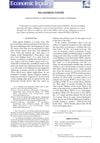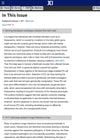 7 citations,
October 2017 in “Urologic Oncology: Seminars and Original Investigations”
7 citations,
October 2017 in “Urologic Oncology: Seminars and Original Investigations” Men with male pattern baldness have a higher risk of aggressive prostate cancer and benign prostatic hyperplasia.
 2 citations,
January 2020 in “Journal of Experimental Social Psychology”
2 citations,
January 2020 in “Journal of Experimental Social Psychology” Baldness and shaved heads change how traits are seen but don't really affect leader preferences.
 1 citations,
March 2019 in “Economic Inquiry”
1 citations,
March 2019 in “Economic Inquiry” Balding men value hair restoration highly, willing to pay over $5,000 for a slight improvement.
 May 2018 in “Academic Medicine”
May 2018 in “Academic Medicine” Hair loss can cause significant emotional and psychological distress.
 3 citations,
June 2004 in “Alternative and Complementary Therapies”
3 citations,
June 2004 in “Alternative and Complementary Therapies” The document concludes that hair loss is influenced by genetics and other factors, and while treatments like finasteride can help, they have limitations and side effects.
 September 2003 in “Clinics in Family Practice”
September 2003 in “Clinics in Family Practice” Different hair diseases affect people during childbearing years, with treatments ranging from medication to psychological support.
 February 2011 in “Journal of Clinical Investigation”
February 2011 in “Journal of Clinical Investigation” Genetically repaired stem cells may treat certain genetic diseases, Th17 cells are key in fighting systemic fungal infections, hair loss in AGA is due to progenitor cell loss, and α-synuclein transfer might contribute to Parkinson's disease progression.
 239 citations,
July 2002 in “Clinical and Experimental Dermatology”
239 citations,
July 2002 in “Clinical and Experimental Dermatology” Low iron and L-lysine levels can cause hair loss in women, and increasing these nutrients can reduce hair shedding.
 179 citations,
September 1998 in “BMJ”
179 citations,
September 1998 in “BMJ” Hair loss in men is common, treatable, but not curable.
 159 citations,
September 2001 in “European Journal of Cancer Care”
159 citations,
September 2001 in “European Journal of Cancer Care” Chemotherapy-induced hair loss significantly affects patients' well-being, and nurses are key in helping them cope, but more research is needed to find effective treatments.
 77 citations,
March 2001 in “Clinics in Dermatology”
77 citations,
March 2001 in “Clinics in Dermatology” Androgenetic alopecia involves genetics, hormones, and can be treated with medications or surgery.
 41 citations,
January 2020 in “BioMed Research International”
41 citations,
January 2020 in “BioMed Research International” Micrografts improve hair density and thickness without side effects.
 2 citations,
January 1966 in “American Journal of Obstetrics and Gynecology”
2 citations,
January 1966 in “American Journal of Obstetrics and Gynecology” More research is needed to find a cure for hair loss after pregnancy.
 January 2019 in “Elsevier eBooks”
January 2019 in “Elsevier eBooks” Different hair disorders have specific treatments and outcomes, with some resolving on their own and others requiring medication or emotional support.
 18 citations,
January 2016 in “Skin appendage disorders”
18 citations,
January 2016 in “Skin appendage disorders” The paper suggests improving diagnosis and treatment of telogen effluvium but does not recommend a new classification system.
 14 citations,
October 2020 in “Natural Products and Bioprospecting”
14 citations,
October 2020 in “Natural Products and Bioprospecting” Various treatments, including FDA-approved drugs, natural products, and oral supplements, can help with hair loss, but a patient's medical history and potential allergies should be considered when choosing a treatment.
 9 citations,
February 2012 in “Social Semiotics”
9 citations,
February 2012 in “Social Semiotics” The document concludes that modern photo stories help represent and challenge how breast cancer affects women's identities and societal norms.
 1 citations,
January 2002 in “Dermatology + psychosomatics”
1 citations,
January 2002 in “Dermatology + psychosomatics” Most people worried about abnormal hair loss actually have psychological issues like depression or anxiety.
 83 citations,
May 1999 in “International Journal of Dermatology”
83 citations,
May 1999 in “International Journal of Dermatology” Hair loss that spreads out can often fix itself or be treated by finding and handling the cause.
 52 citations,
June 1999 in “Endocrinology and Metabolism Clinics of North America”
52 citations,
June 1999 in “Endocrinology and Metabolism Clinics of North America” Antiandrogen treatments combined with oral contraceptives can help manage hair growth and hair loss in women with PCOS.
 45 citations,
March 2010 in “Journal der Deutschen Dermatologischen Gesellschaft”
45 citations,
March 2010 in “Journal der Deutschen Dermatologischen Gesellschaft” A systematic approach is crucial for managing hair loss in women.
 14 citations,
January 2013 in “International Journal of Trichology”
14 citations,
January 2013 in “International Journal of Trichology” Treating hair loss requires a comprehensive approach that addresses both physical and emotional aspects, with a focus on diagnosis, patient education, and good communication.
 4 citations,
January 2021 in “Skin appendage disorders”
4 citations,
January 2021 in “Skin appendage disorders” Trichodynia is a painful scalp condition not directly linked to the amount or type of hair loss and may involve psychological factors, with treatments showing mixed results.
 1 citations,
March 2012 in “Indian Journal of Rheumatology”
1 citations,
March 2012 in “Indian Journal of Rheumatology” Most lupus patients in the study experienced hair loss, which greatly affected their mental and social well-being.
 1 citations,
June 2007 in “Journal of Oral and Maxillofacial Surgery”
1 citations,
June 2007 in “Journal of Oral and Maxillofacial Surgery” A woman experienced temporary hair loss after jaw surgery due to the stress of the operation.
 February 2024 in “International Journal For Multidisciplinary Research”
February 2024 in “International Journal For Multidisciplinary Research” The herbal hair oil with natural extracts can improve hair health and reduce dandruff.
 September 2011 in “Cancer”
September 2011 in “Cancer” Men who start losing hair at 20 may have a higher chance of getting prostate cancer later.
April 2023 in “Journal of Cutaneous Medicine and Surgery”  May 2022 in “Journal of the Egyptian Women's Dermatologic Society (Print)”
May 2022 in “Journal of the Egyptian Women's Dermatologic Society (Print)” Women's hair loss can be due to hormonal changes and various conditions, with treatments focusing on stopping progression and managing symptoms.
 September 2020 in “Benha Journal of Applied Sciences”
September 2020 in “Benha Journal of Applied Sciences” Patients with Alopecia Areata have lower levels of zinc and biotin than healthy individuals.





























